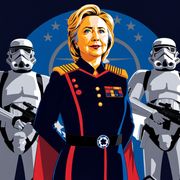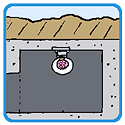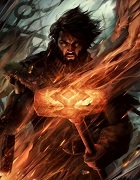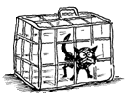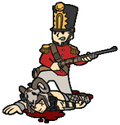|
GyverMac posted:Also you have the norse berserkers who were believed to reach their state of berserkergang via a mix of alcohol and shrooms. Imagine the mindfuck of tripping balls whilst surrounded by the intense noise and chaos of a medieval battle. Sorry, even the article you linked claims that's a myth: Wikipedia posted:A single source for the notion that Vikings used A. muscaria to produce their berserker rages was first suggested by the Swedish professor Samuel Ödman in 1784. Ödman based his theories on reports about the use of fly agaric among Siberian shamans. The notion has become widespread since the 19th century, but no contemporary sources mention this use or anything similar in their description of berserkers. Today, it is generally considered an urban legend or at best speculation that cannot be proven. Muscimol is generally a mild relaxant, but could create a range of reactions within a range of people. It is possible that it could make a person incredibly angry, as well as make them "very jolly or sad, jump about, dance, sing or give way to great fright".
|
|
|
|

|
| # ? Apr 27, 2024 14:26 |
|
Don't forget that for much history alcohol was a hell of a lot safer to drink than water, navy grog (rum and lime/orange juice added to water) was developed to stop men getting drunk on their rum ration, prevent scurvy (accidental as fruit juice was first added for taste) and make bad tasting water more drinkable. Coffee and tea took their place as the drink of choice for armies later on as along with beer they require you to actually boil the water as part of the process.
|
|
|
|
Mr. Sunshine posted:Sorry, even the article you linked claims that's a myth: Thanks for pointing that out. Funny how some erroneous/unproven historical facts just seem to not erase itself from the public memory. I've always heard about the connection between berserkers and shrooms since i was a kid, and at one point even my history teacher 4th grade told us about it, so I've just always assumed it was true without bothering to see any proof.
|
|
|
|
Another good thing about beer was, along with the fact that the water was boiled at the start of brewing process, that if it became spoiled during storage (meaning the barrel wasn't sealed properly or the process wasn't hygienic enough) you would immediately notice it from the taste when you might not recognize the same from pure water. Beer was also a nutritious drink that stayed good for a long time when stored properly. It was the energy drink of the time.
|
|
|
|
Wasn't booze largely responsible for that army which ended up fighting itself in battle?
|
|
|
|
I don't know about that. But during WW2 it was considered a bit of a problem that when enemy supply depots were overrun by advancing armies, the first instinct of every soldier worth his name was to find out the cognac and vodka stashes. The same went with any unevacuated liquor stores, apothecaries or distilleries. Eg. in the Lapland war Finnish troops landed behind the frontlines in the port town of Tornio and quickly overran the few Germans. They also captured the so-called "little Berlin", a German supply depot with large alcohol reserves. The result was that instead of expanding the bridgehead, three Finnish battalions spent the first day of the operation getting wasted, giving Germans vital time to react and try to contain the break. If the Finnish Republic lasts for a thousand years, men will still say, 'This was their finest happy hour.'
|
|
|
|
GyverMac posted:Thanks for pointing that out. That's because reputable and well-known books often have inaccuracies within them that do not seriously detract from their greater argument or narrative and lesser regarded but more accurate work is ignored because people have trouble revising their opinions, especially about something as important as history, and when they have an authority of some kind to back them up. Moreover, books are expensive and there is no master list of new historical perspectives so people often miss out on important work due to a expense and a lack of attention. This is especially important for school textbooks which may not be updated for long periods of time, but are often where children get their first engagement with history in any real sense. Sometimes of course people are just bad at history. John Keegan's question of whether the concept of 'strategy' is applicable to the Middle Ages is so loving stupid and impossible to excuse as anything other than bad scholarship for a historian of his education.
|
|
|
|
Shimrra Jamaane posted:Wasn't booze largely responsible for that army which ended up fighting itself in battle? Yeah that might be the Austrians and their self-inflicted defeat at Karansebes youre thinking of. Basically some hussar scouts whilst out on patrol, found a gypsy caravan that sold schnaps. They proceeded to buy it all, and get hosed up on said schnaps, as any sane soldier would do. Then when some infantry soldiers came along and saw what a great party the hussars were having, they wanted in on the action. The hussars responded with building a makeshift barricade and refusing to share. A squabble ensued, were one soldier fired a shot, and it rapidly devolved into utter chaos after that. After the smoke settled an approximate figure of 10.000 dead and wounded soldier was the result.
|
|
|
|
Christoff posted:Can you guys tell me aolbout drug use during any war? Just gnerally curious. I know the Nazis used meth but not much else. I'm sure less contemporary Militaries drank quite a bit around battles and he'll were maybe eating opium to numb pains. I recall the Japanese used stimulants in large quantities too, naval aviators had something called "Aviation Tablet 1" that IIRC was some kind of amphetamine. The Germans in WW2 also had some kind of chocolate bar containing stimulants.
|
|
|
|
I've read (I think it was in Max Hastings' Armageddon) that the Luftwaffe issued its pilots bottles of chocolate milk laced with amphetamine, to keep them awake and alert on long flights.
|
|
|
|
GyverMac posted:Yeah that might be the Austrians and their self-inflicted defeat at Karansebes youre thinking of. Except of course that the whole thing may not have happened (the first sentence on the article you linked sez it's "probably apocryphal"). Sure would make for a good movie, though.
|
|
|
|
Some of modern Afghan army are massive potheads. I saw this documentary following a British solider around at home and in theatre, and the Afghan guys they were going out on patrol with would smoke up a poo poo load of hash everytime they stopped for a rest, and then go into a fight 5 mins later stoned off their faces. Here ya go; http://www.youtube.com/watch?v=Kc8w0IX4UQc BeigeJacket fucked around with this message at 19:54 on Dec 11, 2011 |
|
|
|
Today's airforces also use drugs like it was 1968. Some amphetamines are routinely carried on fighter jets for emergencies like crashes, or sometimes to keep you awake. This is from 2003:quote:As two pilots face a possible court-martial, the air force says "go pills" kept tired pilots alive in Afghanistan. Lianne Hart reports from New Orleans. War On Drugs, On Drugs.
|
|
|
|
Rodrigo Diaz posted:
Can you expand on this? I've only read "The Face of Battle," but I thought it was really well-written. Did Keegan mean to say that Middle Age armies didn't consider strategy at all in battle?
|
|
|
|
Does tricking an enemy into using drugs count? In WW1, Major Meinertzhagen dropped cigarettes covered with propaganda over Turkish lines. The soldiers enjoyed the cigarettes but didn't surrender as asked. The next batch of cigarettes, however, were laced with opium. A "large percentage" of Turkish troops were affected when the British attacked the following day.
|
|
|
|
Skanky Burns posted:Does tricking an enemy into using drugs count? Why wouldn't you just lace the cigarettes with cyanide in that case?
|
|
|
|
Shimrra Jamaane posted:Why wouldn't you just lace the cigarettes with cyanide in that case? I think that's probably crossing the line into straight up chemical weapons.
|
|
|
|
Allenby actually vetoed the plan as he thought using a drug was much like using poison (but Meinertzhagen went ahead with it anyway).
|
|
|
|
Throatwarbler posted:I think that's probably crossing the line into straight up chemical weapons. Not like that wasn't the norm in WWI.
|
|
|
Shimrra Jamaane posted:Why wouldn't you just lace the cigarettes with cyanide in that case? Because thats not cricket, thats why.
|
|
|
|
|
Shimrra Jamaane posted:Why wouldn't you just lace the cigarettes with cyanide in that case? Because people who smoked it would die very quickly and you'd only cause a few casualties. The effects of opium wouldn't be obvious as quickly, and even if they knew of it a lot of people would probably smoke it anyway.
|
|
|
|
Right, giving poison cigarettes to hostile soldiers might kill a few but the rest would be even more opposed to you. But if you give them free cigarettes and
|
|
|
|
For the alcohol question - During the Indian Mutiny there were incidents where the mutineers lined the streets with bottles to stop the British troops. The officers then had to run ahead and smash them with their swagger sticks to keep their men moving. The Indian Mutiny also gave us people being blown from the guns as a method of execution for mutineers.
|
|
|
|
Were there instances where a typhoon / tropical depression had a role in a contemporary naval battle? I've so far read about the 4th Fleet incident for the Japanese, Halsey's own run-in with Typhoon Cobra and that other typhoon that hit a week after Operation Downfall was supposed to kick-off.
|
|
|
Baconroll posted:For the alcohol question - During the Indian Mutiny there were incidents where the mutineers lined the streets with bottles to stop the British troops. The officers then had to run ahead and smash them with their swagger sticks to keep their men moving. The Indian Mutiny is one of the darkest chapters of the British Armies history. It was not taught in my History classes although to be fair all the good and bad Imperial stuff was glossed over and we learnt how awesome Native Americans were instead. So it wasn't a bad trade too much.
|
|
|
|
|
Baconroll posted:The Indian Mutiny also gave us people being blown from the guns as a method of execution for mutineers. That method of execution was in use in India before the British arrived. It was just copied by the British. The British did do horrific things in India it is true, but for historical accuracy you can't really blame the invention of that particular horror on the British.
|
|
|
|
What do you mean "blown from the guns"? Like shot out of a cannon?
|
|
|
Shimrra Jamaane posted:What do you mean "blown from the guns"? Like shot out of a cannon? Tied to the barrel of a heavy cannon, lashed by the wrists and legs to the wheels and simply decimated by the projectile. I've seen some old black and white pictures from the turn of the 20th century where the bones of the executed were left in piles in the abandoned barracks.
|
|
|
|
|
I can't imagine the balls you'd have to dangle between your legs to stand in open ground completely straight while musket bullets wizzle by and cannon shots obliterate entire lines. Not to mention that while this act is horrific, it was followed by a bayonet charge were you had to stab your enemy right in the gut and see him die before you. No trenches, no shield, no cuirass, nothing could protect you but divine will. War in the 19th century must've been the most terrifying time in military history.
|
|
|
|
How long until trenches were developed? It seems like a very good idea for not getting shot.
|
|
|
|
Trenches have been around since the middle ages (you dont really need to "develop" holes in the ground), but they make it hard to advance.
|
|
|
|
Boiled Water posted:How long until trenches were developed? It seems like a very good idea for not getting shot. A lot of people argue that the American Civil War was the first modern implementation of trench warfare. All the pieces were in place, rifled shell muntions, rapid fire guns, ventilated trench positions, and so on. Depends on how you want to count it, sapping with gambion and fascine has been going on since about 5 minutes after fortification.
|
|
|
|
Boiled Water posted:How long until trenches were developed? It seems like a very good idea for not getting shot. For Siege Warfare? They've been around literally forever. In terms of open-warfare, Slo-Tek is right, the last year of the ACW is the point where the ability to keep units in the field all year round meant that open warfare and siege warfare merged together.
|
|
|
Boiled Water posted:How long until trenches were developed? It seems like a very good idea for not getting shot. If we mean "trench" to be a hole in the ground, then yeah, forever. If you mean the kind of trenches that the term "trench warfare" was meant to describe that reached their peak effectiveness in World War I, then the origin is the American Civil War, particularly in the latter stages of the war. The Battles of Fredericksburg, Franklin, and Cold Harbor were examples of trenchworks that were put in place relatively quickly and used to deadly effect. The Sieges of Vicksburg and (especially) Petersburg saw the development of a lot of the kinds of field fortifications that one would have expected to see 50 years later in France. Given that it saw the first widespread use of rifles, trench warfare, and armored steamships, there's a reason why a lot of historians call the American Civil War the first "modern" war. Of course, since it also had a reliance on shoulder-to-shoulder musketry and cavalry charges, you could also call it the last "pre-modern" one. Or perhaps best of all, you could say that it was a transition between two eras of warfare, and that victory came to those generals who learned how to fight in the new era rather than the last one. (See: Grant, Ulysses S.) jng2058 fucked around with this message at 01:10 on Dec 13, 2011 |
|
|
|
|
jng2058 posted:If we mean "trench" to be a hole in the ground, then yeah, forever. I think the WW1 style of trench warfare was first in the Maori Wars in NZ back in the 1840's, where they were able to cause huge amounts of damage to the British forces. Then it was the American civil war and the 2nd Boar war.
|
|
|
Mans posted:I can't imagine the balls you'd have to dangle between your legs to stand in open ground completely straight while musket bullets wizzle by and cannon shots obliterate entire lines. Not to mention that while this act is horrific, it was followed by a bayonet charge were you had to stab your enemy right in the gut and see him die before you. Don't forget no medical aid and no social security if you lost your legs! You can sort of see why enforced conscription and press ganging was the only ways of getting sane men into the fight.
|
|
|
|
|
jng2058 posted:Given that it saw the first widespread use of rifles, trench warfare, and armored steamships, there's a reason why a lot of historians call the American Civil War the first "modern" war. Is there any truth to the claim that the great European powers did not pay all that much attention to the ACW, resulting in the horrible casualties from charging straight into trenches during WW1?
|
|
|
|
Some certainly professed contempt. Most famous, almost ubiquitous, is Moltke the Elder's dismissal of the "armed mobs," specifically, that "there is nothing to be learned by two armed mobs chasing each other around the country," which is a shockingly benighted view.
|
|
|
|
This thread is starting to eat its own tail because I've posted this before. The ACW was very different from WW1 because the French invented modern artillery in 1891. The artillery of the ACW could fire 1 or 2 rounds per minute and had to be aimed after every shot because when you fire the loving gun goes flying off into the bushes. It was basically Napoleonic-era bullshit and wasn't really of much use other than against fixed fortifications and when the crew could get off a few cannister rounds at close range before being over run. The French 75mm hydraulically stabilized gun could fire 15 rounds per minute, faster than a bolt action rifle, and because of the hydraulic stabilization, every round tended to land in the same general place. This was serious business. The whole face and imagery of war changed. Machine guns? Yeah they're good out to what 600 meters? Whatever. Things change when you've got hundreds of these artillery pieces that can accurately hit targets out to 6 km. When that happens you better start digging *a lot* of trenches, even the HQ and support troops that are far away out of small arms range, or most of your army will be dead before any of them ever lay eyes on the enemy. Even then something like 75% of battle casualties in WW 1 and 2 were caused by artillery. Soldiers started wearing steel helmets in WW1 and still wear helmet today primarily because they protected the head from air burst shrapnel which had become the biggest killer on the battlefield. I'm constantly surprised that the French don't get more credit (if you could call it that) for this innovation, I guess tube artillery just doesn't look as cool in action as machine guns or P-51s. Throatwarbler fucked around with this message at 05:12 on Dec 13, 2011 |
|
|
|

|
| # ? Apr 27, 2024 14:26 |
|
The ACW is a very interesting command situation to examine since you had these massive armies and extremely rudimentary communications systems and poor understanding of how to organize, move, and fight with large armies. Napoleon got around it by being an organizational genius - in the ACW, you had plenty of genius combat commanders but nobody with anything like Nappy's organizational acumen. Civil War Generalship - The Art of Command by W.J. Wood and The Warrior Generals - Combat Leadership in the Civil War by Thomas Buell ($0.25 used on Amazon!) are two excellent books that go into the challenges faced by ACW commanders and how different commanders dealt with it. I frankly haven't read either recently enough to put together a fair summary for the thread (though I may now having been reminded of it) but I encourage others to look into these. Much better than Shelby Foote's Confederate fanboy historical fiction that some like to read.
|
|
|





